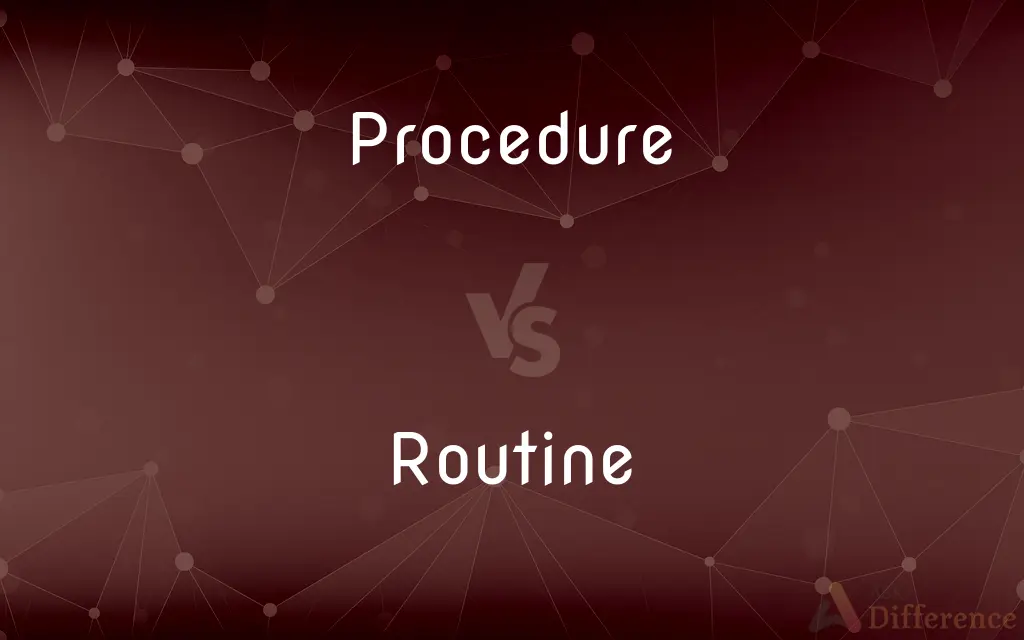Procedure vs. Routine — What's the Difference?
By Maham Liaqat & Urooj Arif — Updated on March 14, 2024
A procedure is a set of specific steps to accomplish a task, often detailed and technical, while a routine is a regular way of doing things, typically less formal and more about habit.

Difference Between Procedure and Routine
Table of Contents
ADVERTISEMENT
Key Differences
Procedures are structured and detailed series of steps followed to achieve a particular end. They are often associated with professional or technical contexts, such as medical operations, laboratory experiments, or safety protocols, where precision and adherence to guidelines are crucial. On the other hand, routines are the regular patterns or habits that individuals or groups follow in daily life. Routines can be personal, like morning or workout routines, or organizational, like the daily operations in a workplace. They are generally less formal than procedures and can be adjusted based on personal preferences or changing circumstances.
Procedures are typically documented and require training or instruction to perform correctly. They are designed to ensure consistency, safety, and efficiency, especially in complex or potentially hazardous tasks. Procedures are critical in fields where errors can have serious consequences, emphasizing the importance of following each step as outlined. Routines, in contrast, are often developed over time through practice and repetition. They may not be formally documented and can vary significantly from one person or organization to another. Routines help establish a sense of order and predictability but are more flexible than procedures.
The development of a procedure usually involves analysis, testing, and revision to ensure effectiveness and safety. This process may be governed by standards set by professional bodies or regulatory agencies. Procedures must often be updated to reflect new knowledge, technologies, or regulations. Routines, however, evolve more organically based on personal or organizational needs and preferences. While they can be influenced by external factors, changes to routines are generally made to improve personal efficiency or satisfaction.
In terms of adherence, deviation from a procedure can lead to errors, inefficiencies, or even dangerous outcomes, making strict compliance essential. In contrast, deviation from a routine does not typically have serious consequences and can sometimes lead to the discovery of more effective or enjoyable ways to accomplish tasks. Routines offer more flexibility and can be adapted as needed to better suit the individual or situation.
The purpose of procedures and routines also differs. Procedures are designed to achieve specific outcomes with maximum efficiency and minimum risk. They are essential for tasks that require precision and reliability. Routines aim to create structure and regularity in daily activities, contributing to productivity and well-being by reducing the need for constant decision-making and helping to manage time effectively.
ADVERTISEMENT
Comparison Chart
Nature
Specific, detailed steps for a task.
Regular patterns or habits of doing things.
Context
Professional, technical, requiring precision.
Daily life, personal or organizational habits.
Formality
Highly structured, often documented.
Less formal, flexible, not always documented.
Development
Involves analysis, testing, governed by standards.
Evolves organically, based on personal needs.
Adherence
Strict compliance required.
More flexible, allows for deviations.
Purpose
Achieve specific outcomes with efficiency and safety.
Create structure and predictability in daily activities.
Compare with Definitions
Procedure
Structured and detailed steps.
The surgical procedure for appendectomy is meticulously outlined.
Routine
Varies by individual or organization.
Each classroom has a different routine for managing transitions.
Procedure
Requires training/instruction.
Lab technicians follow strict procedures for handling chemicals.
Routine
Flexible and adaptable.
He adjusted his evening routine to include more family time.
Procedure
Governed by professional standards.
The procedure for installing electrical wiring complies with national safety codes.
Routine
Developed through practice.
The team's routine for project updates streamlined their workflow.
Procedure
Designed for consistency and safety.
Emergency evacuation procedures ensure everyone's safety.
Routine
Regular patterns or habits.
Her morning routine includes yoga and meditation.
Procedure
Updated to reflect new knowledge.
Medical procedures are regularly updated based on the latest research findings.
Routine
Aims to create structure in daily life.
Establishing a study routine helped her manage her coursework more effectively.
Procedure
A series of steps taken to accomplish an end
A medical procedure.
Evacuation procedures.
Routine
A sequence of actions regularly followed
As a matter of routine a report will be sent to the director
I settled down into a routine of work and sleep
Procedure
An established or official way of doing something
The police are now reviewing procedures
Parliamentary procedure
Routine
Performed as part of a regular procedure rather than for a special reason
The Ministry insisted that this was just a routine annual drill
Procedure
A manner of proceeding; a way of performing or effecting something
Standard procedure.
Routine
Organize according to a routine
All had been routined with smoothness
Procedure
(Computers) A set of instructions that performs a specific task; a subroutine or function.
Routine
A set of customary or unchanging and often mechanically performed activities or procedures
A routine of housework.
Procedure
A set of established forms or methods for conducting the affairs of an organized body such as a business, club, or government.
Routine
The practice of such activities or procedures
"Routine had caused stagnation" (Garry Wills).
Procedure
(Law) The set of rules under which litigation is conducted, especially in contrast to the set of substantive legal principles that determine the merits of legal controversies and disputes.
Routine
A scripted piece of entertainment, especially in a nightclub or theater
The audience laughed at the comedian's routine.
Procedure
A particular method for performing a task.
Routine
(Slang) A particular kind of behavior or activity
Must you go into your hurt routine when you don't get your way?.
Procedure
A series of small tasks or steps taken to accomplish an end.
Routine
(Computers) A set of programming instructions designed to perform a specific limited task.
Procedure
(uncountable) The set of established forms or methods of an organized body for accomplishing a certain task or tasks.
Ensure that you follow procedure when accessing customers' personal information.
Routine
In accord with established procedure
A routine check of passports.
Procedure
The steps taken in an action or other legal proceeding.
Routine
Habitual; regular
Made his routine trip to the store.
Procedure
(obsolete) That which results; issue; product.
Routine
Having no special quality; ordinary
A routine day.
Procedure
(computing) A subroutine or function coded to perform a specific task, but does not return a value.
Routine
A course of action to be followed regularly; a standard procedure.
Procedure
(medicine) A surgical operation.
Routine
A set of normal procedures, often performed mechanically.
Connie was completely robotic and emotionless by age 12; her entire life had become one big routine.
Procedure
The act or manner of proceeding or moving forward; progress; process; operation; conduct.
Routine
A set piece of an entertainer's act.
Stand-up comedy routine
Procedure
A step taken; an act performed; a proceeding; the steps taken in an action or other legal proceeding.
Routine
(computing) A set of instructions designed to perform a specific task; a subroutine.
Procedure
That which results; issue; product.
Routine
According to established procedure.
Procedure
A particular course of action intended to achieve a result;
The procedure of obtaining a driver's license
It was a process of trial and error
Routine
Regular; habitual.
Procedure
A process or series of acts especially of a practical or mechanical nature involved in a particular form of work;
The operations in building a house
Certain machine tool operations
Routine
Ordinary with nothing to distinguish it from all the others.
Procedure
A set sequence of steps, part of larger computer program
Routine
A round of business, amusement, or pleasure, daily or frequently pursued; especially, a course of business or offical duties regularly or frequently returning.
Procedure
A mode of conducting legal and parliamentary proceedings
Routine
Any regular course of action or procedure rigidly adhered to by the mere force of habit.
Routine
An unvarying or habitual method of procedure
Routine
A short theatrical performance that is part of a longer program;
He did his act three times every evening
She had a catchy little routine
It was one of the best numbers he ever did
Routine
A set sequence of steps, part of larger computer program
Routine
Occurring at fixed times or predictable intervals;
Made her routine trip to the store
Routine
Found in the ordinary course of events;
A placid everyday scene
It was a routine day
There's nothing quite like a real...train conductor to add color to a quotidian commute
Common Curiosities
How can routines be beneficial?
Routines help create structure and predictability in daily life, reducing decision fatigue and enhancing productivity and well-being.
Why is adherence to procedures important?
Adherence to procedures ensures tasks are completed safely, efficiently, and consistently, which is crucial in technical or dangerous tasks.
Do procedures change over time?
Yes, procedures are updated to reflect new knowledge, technologies, or regulations to maintain effectiveness and safety.
Can a routine become a procedure?
Yes, if a routine is formalized, detailed, and standardized, it can evolve into a procedure, especially in professional contexts.
How are routines developed?
Routines develop organically through practice and repetition, often based on personal or organizational needs and preferences.
What's the difference between a procedure and a routine?
Procedures are specific, detailed steps for tasks, often technical, while routines are regular habits or ways of doing things, typically less formal.
Who creates procedures?
Procedures are usually created by professionals or experts in a specific field and may be governed by standards from professional bodies or regulatory agencies.
What happens if a procedure is not followed?
Not following a procedure can result in errors, inefficiencies, or dangerous outcomes, emphasizing the need for strict compliance.
Can routines help with mental health?
Yes, routines can significantly benefit mental health by providing stability, reducing stress, and improving sleep patterns.
Why might procedures be updated?
Procedures are updated in response to new research, technological advancements, or changes in regulations to enhance safety and effectiveness.
How does flexibility in routines enhance daily life?
Flexibility allows individuals to adjust their routines as needed, improving efficiency, satisfaction, and adaptability to change.
Is it okay to deviate from a routine?
Deviating from a routine is generally okay and can lead to discovering more effective ways to accomplish tasks or improve personal satisfaction.
How do cultural differences affect routines and procedures?
Cultural differences can influence the structure, adherence, and perception of routines and procedures, reflecting varying priorities and values.
Are procedures only used in professional settings?
While commonly associated with professional contexts, procedures can also apply to any detailed, step-by-step task requiring precision.
What's the impact of not having routines?
Without routines, daily life can become chaotic, leading to increased stress, inefficiency, and a sense of being overwhelmed.
Share Your Discovery

Previous Comparison
Cole vs. Cabbage
Next Comparison
Channel vs. ChanelAuthor Spotlight
Written by
Maham LiaqatCo-written by
Urooj ArifUrooj is a skilled content writer at Ask Difference, known for her exceptional ability to simplify complex topics into engaging and informative content. With a passion for research and a flair for clear, concise writing, she consistently delivers articles that resonate with our diverse audience.















































